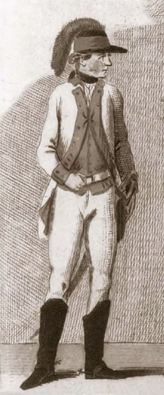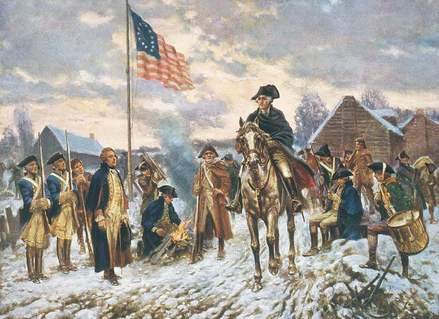 A 1784 German illustration depicting a member of Washington's Life Guard. (Photo Courtesy of Library of Congress)
A 1784 German illustration depicting a member of Washington's Life Guard. (Photo Courtesy of Library of Congress) McCrory lived a varied and interesting life before settling in Alabama. He was born in the tiny village of Larga on the River Bann in County Antrim, Ireland, on May 15, 1758, and he came to the colonies when he was seventeen years old, along with his brothers Hugh, John, and Thomas. His ship sailed from Belfast, and he set foot on the American continent in Baltimore on July 1, 1775. He headed south and settled in Guilford County, North Carolina, shortly thereafter.
This was a period of restiveness in the colonies, and the nascent colonial independence movement was rapidly gaining traction among newly arrived immigrants. McCrory was no exception. He undoubtedly brought some of the Irish enmity toward the English across the Atlantic with him, and nine months later, on April 15, 1776, he enlisted in the Continental Army for a term of three years. He initially served as a company sergeant under the command of his brother, Capt. Thomas McCrory, as part of the 9th Regiment of the North Carolina Line, led by Col. John P. Williams. The regiment marched north and joined General Washington’s command at Middlebrook, New Jersey, on June 6.
For the next five years, McCrory seemed to be in action at practically every major battle of the revolution. He fought at the Battle of Brandywine under General Washington on September 11, 1777, and at the Battle of Germantown on October 4. For his performance on the battlefield, he was promoted to the rank of ensign in the Life Guard of General Washington, and he also served as one of Washington’s personal bodyguards during the brutal winter of 1777–78 at Valley Forge.
The next year he saw action in the American defeat at the battle of Stono Ferry near Charleston on June 20, 1779. He later fought in the battle of Camden in South Carolina, where General Gates was defeated by Lord Cornwallis’s British troops, in August 1780. One thousand American soldiers were taken prisoner at Camden.
McCrory eventually was captured by Lt. Col. Banastre Tarleton’s Dragoons, who held him prisoner for five months on board a prison ship at Wilmington. McCrory hardly could have picked a worse fate than to be captured by Tarleton, who had earned infamy at the Battle of Waxhaws when American Col. Abraham Buford surrendered his forces to him. According to American accounts, Tarleton ignored the white flag and massacred Buford’s men. The sordid affair came to be known as the Waxhaws Massacre and provided strong anti-British propaganda for the colonials. Given Tarleton’s reputation McCrory undoubtedly feared for his life.
Dr. Bettye Burkhalter of Auburn, McCrory’s great-great-great- great-granddaughter, relates that “the British captured him and held him prisoner for months in only his underwear on one of their ships anchored a safe distance from shore. With each passing month his Irish blood boiled. One night he jumped overboard and miraculously swam through the icy waters to shore.”
His brief imprisonment apparently did not cool his desire to fight the British, and shortly after his escape he rejoined the Continental Army and served under General Greene at the Battle of Guilford Courthouse on March 15, 1781. He was honorably discharged in the spring of 1782, ending his military career.
On February 28, 1782, McCrory married Jane Gilmore, and the couple moved to Tennessee and started a family. He stayed there until sometime around 1820, when he moved his family (which had grown to twelve children) to Alabama. In 1826 McCrory started buying land in Alabama, and over the next ten years he purchased a total of 840 acres near the town of Vienna in what is now Pickens County.
McCrory became one of Vienna’s first citizens, moving there when the town was in its infancy. Settled in the 1820s, the town was established on the east side of the Tombigbee River as a river port and trading center. The river provided transportation for Vienna’s farmers, who loaded their cotton on riverboats to be taken downstream to Mobile— though today little remains of the town other than a historic marker identifying the site of a former school and the foundations of a couple of houses.
McCrory lived with his son Robert in Pickens County, and on June 13, 1829, he was granted a military pension based on his Revolutionary War service. The latter years of his life were quiet, and it appears that this pension and cotton farming were his sources of income during his fourteen years in Alabama.
McCrory died on November 24, 1840, at the age of eighty-two. He is buried five miles south of Aliceville in Old Bethany Cemetery at the site of the Old Bethany Primitive Baptist Church, a structure that was abandoned and torn down in the early 1900s. McCrory is interred next to his wife, who had passed away ten months before his own death. Their marble tombstones stand side by side and are bracketed by a simple redbrick monument. The inscription on James McCrory’s tombstone reads:
In Memory of JAMES McCRORY. Who departed this life November 24th 1840 Aged 82 years 6 months and 9 days. The deceased was a soldier of the Revolution and was at the battles of Germantown Brandywine and Guilford Courthouse he was one of Washington’s Life Guard at Valley Forge and served his country faithfully during the war. Peace to the soldiers’ dust.
James McCrory did finally get some measure of recognition. In 1986 the Pickens County Chapter of the Daughters of the American Revolution erected a sign highlighting his military service near the Old Bethany Cemetery entrance, and in 1993 the Alabama State Legislature adopted a resolution naming a section of Highway 14 in Pickens County the “James McCrory Memorial Highway.”
This feature was previously published in Issue 103, Winter 2012.
About the Author
Thomas V. Ress is a freelance writer who resides in Athens, Alabama. He writes about adventure, outdoor destinations, and Alabama history.

 RSS Feed
RSS Feed